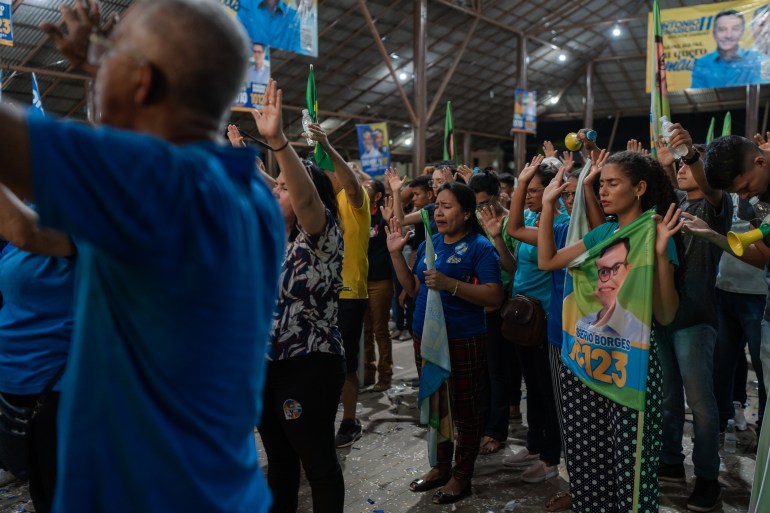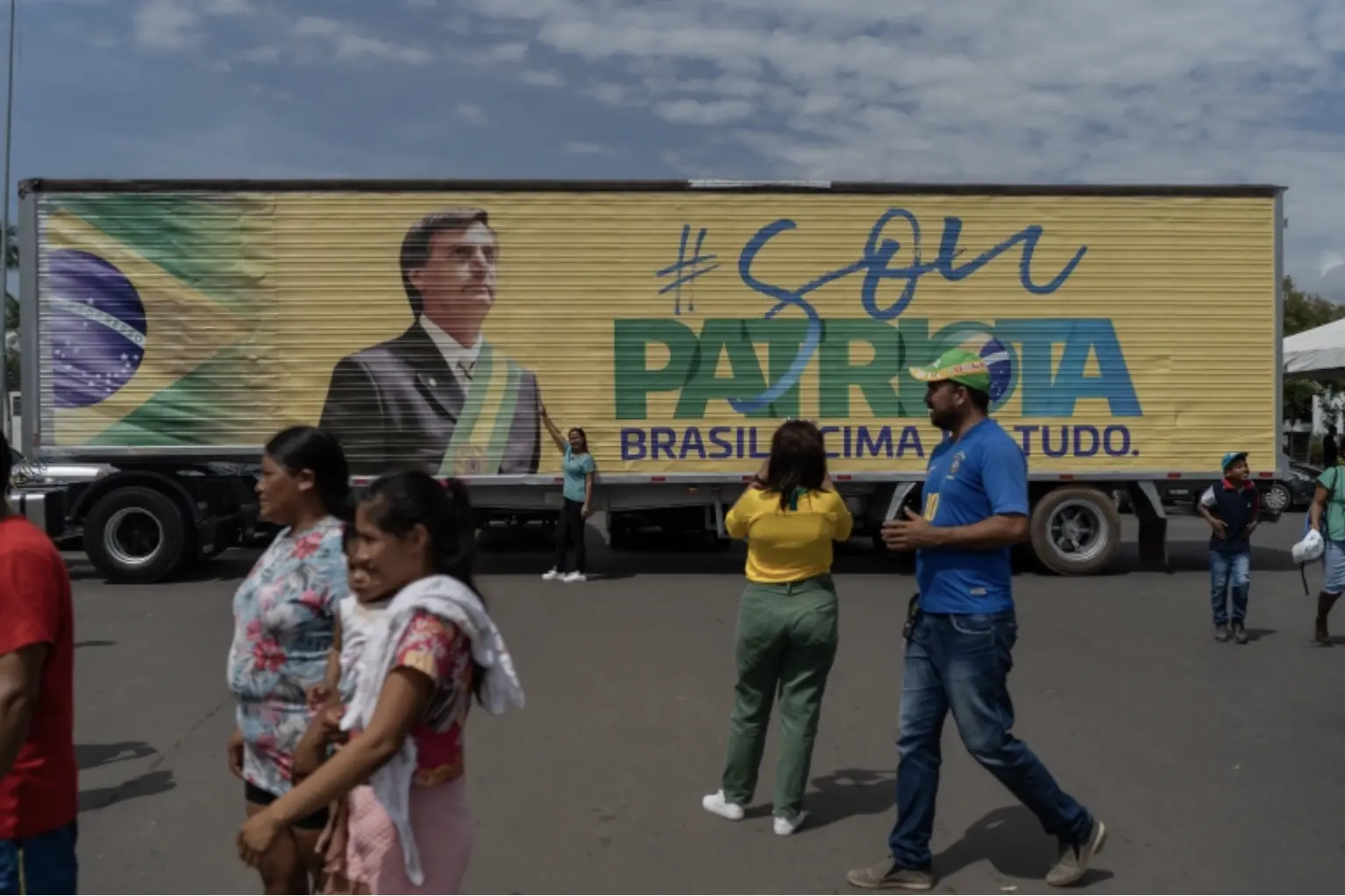
Far-right incumbent Jair Bolsonaro trails in national polls, but leads by a wide margin in Brazilian state of Roraima.
BOA VISTA, BRAZIL—Standing centre-stage at a campaign event, Antonio Denarium closes his eyes and holds his hands open in prayer. Below him in the crowd, dozens of others perform the same gesture, commonly associated with Brazil’s evangelical Christian community.
Courting the religious vote is a shrewd move for any politician here in Roraima, a conservative corner of Brazil’s Amazon on the border with Venezuela and Guyana.
Seeking re-election as state governor, Denarium is an outspoken supporter of Brazil’s far-right president, Jair Bolsonaro, who is popular among evangelical voters and has more support in Roraima than in any other state.
Speaking to Al Jazeera after the event, Denarium paints a rosy picture of the embattled president’s chances of winning a second term: “President Bolsonaro will be re-elected. He is our partner, he is our friend, and he will help us in the reconstruction of Brazil and the state of Roraima.”
Nationwide polls show Bolsonaro trailing left-wing former President Luiz Inacio “Lula” da Silva by a double-digit margin ahead of Sunday’s election. Some analysts have even cautiously upped the odds of Lula winning more than 50 percent of the vote, thus avoiding a runoff—although a second round still appears likely.
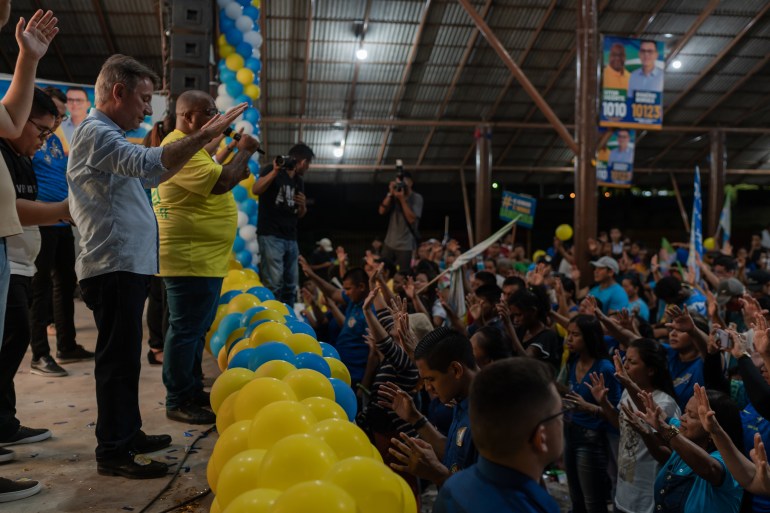
Yet, here in Roraima, Bolsonaro is firmly in the lead, with 62 percent support to Lula’s 18 percent, according to polls by Ipec. The president’s hardline views on street crime and religious conservatism, along with his laissez-faire approach to economic and environmental regulation, resonate in many parts of Brazil, and especially in frontier, agricultural or extraction-driven states, such as Roraima.
“Almost all candidates here in Roraima are surfing the last waves of Bolsonaro,” political scientist Paulo Racoski, who teaches at the Federal Institute of Roraima, told Al Jazeera.
‘Apple of my eye’
In the state race, Denarium leads his rival, Teresa Surita, the former mayor of the state capital Boa Vista, by more than 10 percentage points. Denarium was elected to office in 2018, the same year that Bolsonaro won in Roraima by an overwhelming margin, taking more than 70 percent of the vote. Bolsonaro has described the state as “the apple of my eye.”
In 2019, Roraima’s gross domestic product (GDP) growth was recorded as 3.8 percent, the third-highest among Brazilian states, compared with a nationwide average of 1.2 percent. Denarium also boasts that during his tenure, Roraima has seen the greatest reduction in unemployment of any state.
But Denarium, who declared $21 million Brazilian reals ($4m) in assets this year and is a partner in a local cattle slaughterhouse, has also courted controversy. Several years ago, he was fined 135,000 reals by Brazil’s environmental agency, Ibama, for deforestation on one of his properties in Roraima, according to information compiled obtained by Data Fixers, in partnership with the Fiquem Sabendo data agency.
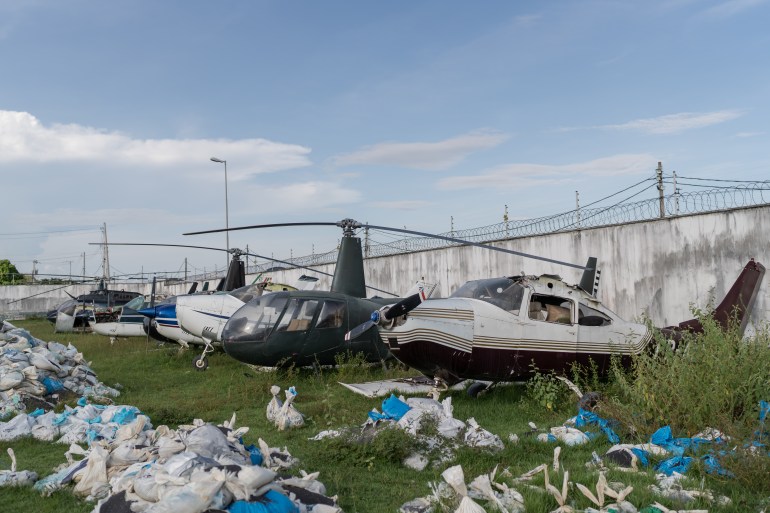
As governor, he tried to legalise wildcat mining on state lands in Roraima, signing a law that was swiftly deemed unconstitutional and overturned last year by Brazil’s top court. Last October, he joined Bolsonaro on a visit to an illegal mining site in the Raposa Serra do Sol Indigenous territory, where the president touted a bill to legalise mining and other industrial-scale activities on Indigenous lands—a long-term pet project for the president.
“[Wildcat mining] is a century-old activity in our state. What I want to do is take these workers out of illegality and legalise them,” Denarium said in a recent interview with local media. “There are more than 50,000 families in our state who depend on this activity.”
Critics, however, fear that the legalisation of wildcat mining in Roraima could fuel “gold laundering”, with gold illegally extracted from Indigenous lands being melted, recast and sold.
“We see this happening in Para [a neighbouring Amazon state], where gold taken from Indigenous lands is laundered,” Alisson Marugal, a federal prosecutor based in Roraima, told Al Jazeera. “It would be a gigantic problem here in Roraima.”
At the federal police headquarters in Roraima, Al Jazeera saw dozens of planes and helicopters seized during crackdowns on illegal mining in the Yanomami Indigenous territory, where thousands of illegal miners are operating—a problem that has worsened significantly since Bolsonaro took office, fuelling a spike in reports of violent incidents and attacks on Indigenous people, advocacy groups say.

The far-flung Yanomami land is Brazil’s largest Indigenous territory, sitting on the border with Venezuela. It is accessible only by plane or boat, and given high demands for food and fuel, mining operations would collapse without this network of aircraft, authorities say. Military police in the state have also been caught moonlighting as armed escorts for illegal mining cargoes.
Marugal acknowledged that “the money from illegal gold mining turns the entire local economy” in Roraima.
“A politician that positions themselves against wildcat mining here, it’s nearly a political suicide,” he said.
The power of mining
Rodrigo Cataratas arrives at Brazil’s 200th Independence Day celebrations atop a sound truck and draped in a Brazilian flag.
“This flag is like a shield,” he says boisterously into a microphone. “It protects me from all the leftists and communists.”
The celebrations took place in Boa Vista’s main square, which features a seven-metre-high monument to gold miners. Cataratas, a pro-mining businessperson and Liberal Party supporter of Bolsonaro, is running for one of eight congressional seats for Roraima against incumbent Joenia Wapichana, who is currently Brazil’s only Indigenous federal lawmaker.
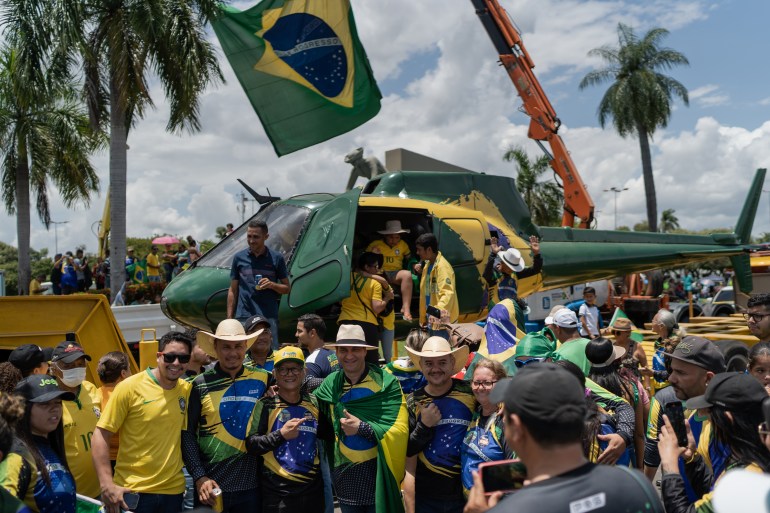
“The state lives off mining,” Cataratas told Al Jazeera. “The president has already signalled and is in favour of mining in the Amazon. How can the population not be pro-Bolsonaro? We are with Bolsonaro and we will fight.”
But Cataratas, who declared 33 million Brazilian reals ($6.45m) in assets this year, including several aircraft, is under investigation by federal police for illegal mining activity, according to police documents seen by Al Jazeera. The documents detail a raid last year at one of his properties, a hangar suspected of operating as a supply base for illegal mining in Yanomami.
In addition to packages of groceries that were labelled with the names of mining sites, police who raided the property also found helicopters that “had several modifications, including replacement of the rear seats with wooden plates”—adaptations considered “strong indications of the use of such aircraft for logistical assistance in mining”.
Cataratas’s lawyer, Ana Paula de Souza Cruz Silva, told Al Jazeera that her client was being unfairly targeted, noting in a statement: “The investigation unsuccessfully seeks to link him to illegal mining in Indigenous areas […] He has been constantly searched and seized on his private properties, some of them without judicial authorisation, and incessant inspections.” She added that Cataratas was “a prospector [with] a regular mining license in non-Indigenous areas.”
According to Cataratas, “Roraima without wildcat mining is impossible.”

Senate battle
Meanwhile, inside his Boa Vista office, Helder Girao, a retired federal judge who is running for Senate for the state of Roraima, praises the Austrian-British economist Friedrich Hayek, author of The Road to Serfdom, a classic in libertarian circles that criticises the “tyranny” of central government planning.
“We need more liberty and less of the state,” Girao told Al Jazeera, describing himself as being “Bolsonaro before Bolsonaro was popular”—although he also admits to having voted for Lula in the past. “Roraima is a conservative state, and Bolsonaro is popular because of that.”
As a judge, Girao enacted an injunction to suspend the demarcation of Roraima’s Raposa Serra do Sol Indigenous land in 2004. The injunction was later overturned by Brazil’s Supreme Court.
In 2018, he ordered the temporary closure of the border with Venezuela to suspend the entry of Venezuelans into Brazil via Roraima. Bolsonaro is a ferocious critic of socialism and Venezuelan leader Nicolas Maduro, and analysts say the humanitarian crisis in Venezuela has strengthened his support in Roraima. Some 350,000 Venezuelan immigrants have settled in Brazil in recent years, the largest number in Roraima and the neighbouring state of Amazonas, according to the UN refugee agency.

“One of the things that people say most is that we don’t want to become Venezuela,” Racoski said. “Everyone here has heard their stories of hunger and hardship.”
Girao will face off in the Senate race against perhaps Roraima’s most famous politician, Romero Juca, who is staging a comeback. After more than two decades in office, he was defeated in 2018; recent polls put him in second place in the Senate race.
Juca arrived in Roraima in the late 1980s after heading Brazil’s Indigenous agency, Funai – a period in which he became known for enabling 40,000 miners to invade Yanomami territory, leading to thousands of Indigenous deaths, according to the National Truth Commission. The commission was tasked with investigating human rights violations in Brazil between 1946 and 1988, focusing particularly on the country’s two-decade military dictatorship.
Among the people in Roraima who are not supporting Bolsonaro is Maria Helena Ribeiro, 65, a retired cleaner who lives in a public housing project in Boa Vista, built on land previously owned by Juca’s family (and later sold to Brazil’s state-owned bank, triggering a conflict-of-interest scandal that Juca rejected as an attempt to smear his family).
Ribeiro’s primary incentive for voting Lula, however, was Bolsonaro’s poor handling of the COVID-19 pandemic: “I have been here for seven years, and we are abandoned by the politicians and by the government.”
